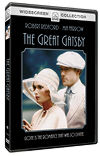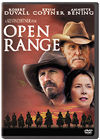Software Reviews
 DVD: The Great Gatsby—Paramount
DVD: The Great Gatsby—ParamountVideo: 4
Audio: 3
Extras: 1
A great book does not necessarily make a great movie, as anyone who ever seen Demi Moore's version of The Scarlet Letter will certainly attest to. There have been three big-screen adaptations of F. Scott Fitzgerald's The Great Gatsby since 1926; if any of them had the most potential, it was the 1974 version starring Robert Redford and Mia Farrow. The script was written by Francis Ford Coppola (fresh off The Godfather), and the studio spared no expense on the budget required to reproduce the lavish Roaring 20s Long Island lifestyle. Unfortunately, this version of The Great Gatsby is pretentious, boring, and utterly lifeless—in other words, it's a lot like the elite socialites who make up most of the cast of characters.
If this adaptation of The Great Gatsby has one fatal flaw, it's the casting. Robert Redford seems to sleepwalk a bit as Gatsby, but he's Oscar-worthy compared with Mia Farrow's Daisy. Sam Waterston brings some energy to the role of Nick, but it's ultimately too little to save this melodramatic mess. Coppola's script is faithful to the original novel, but the dialogue appears forced and unnatural onscreen. Director Jack Clayton certainly captures the look of the 1920s with great skill, and the 1.85:1 anamorphic transfer brings the 30-year-old film to life with impressive results. The Dolby Digital 5.1 soundtrack also makes nice use of the film's jazz score, but a good picture and solid sound can't mask the ultimate character failures that inevitably bring down the movie. Extras are also non-existent on the budget-priced DVD, perhaps because there's not much left to say about yet another mediocre adaptation of The Great Gatsby. At least The Scarlet Letter made you laugh. . .—Gary Maxwell
 DVD: Open Range—Buena Vista
DVD: Open Range—Buena Vista
Video: 4
Audio: 4
Extras: 4
I suppose Open Range is a fine western. . .for someone who's never seen a western before. It brims with clichés of the hard, lonely lot of the cattle driver and the code of frontier morality, culminating in a climactic shootout, naturally. Yet there's an undeniable love of the subject matter by director/star Kevin Costner: His films tend to be sprawling odes to America's beauty, and Range is no exception, even if it was shot in Canada!
Stunning blue skies over rolling green hills are crisply captured with fine detail in some of the most gorgeous outdoor cinematography in years. The only flaw is some faint compression artifacting of the 139-minute, 2.35:1 anamorphic movie, more noticeable in shadowy textures than in scenes of smoke or dust. Both the Dolby Digital 5.1 and DTS soundtracks range from subdued to reference-quality when needed, as in the opening storm that puts ample lightning in the subwoofer and rain in the surrounds. The extensive gunplay in chapter 14 offers deliberately loud punch, effective directionality, and realistic resonance.
In addition to an enjoyable Costner commentary track on disc one, a second platter provides a wealth of supplements, including that rare making-of with some genuine bite to it. A mini-doc on the real American frontiersmen is joined by a dozen deleted scenes, a look at the storyboards, and an unusual behind-the-scenes music video.—Chris Chiarella
 SACD: Albert King with Stevie Ray Vaughan, In Session—Stax
In Session was recorded for Canadian television in December 1983, just as Stevie Ray Vaughan's first release, Texas Flood, was reinvigorating the blues scene. Still, it must have been a big deal for Vaughan to share a stage with one of his idols, blues great Albert King. I know what you're thinking, but there's not a whiff of star tripping or clashing egos between these two generations of blues slingers. Friendly vibes dominate, and you can sense true mutual admiration at every turn.
SACD: Albert King with Stevie Ray Vaughan, In Session—Stax
In Session was recorded for Canadian television in December 1983, just as Stevie Ray Vaughan's first release, Texas Flood, was reinvigorating the blues scene. Still, it must have been a big deal for Vaughan to share a stage with one of his idols, blues great Albert King. I know what you're thinking, but there's not a whiff of star tripping or clashing egos between these two generations of blues slingers. Friendly vibes dominate, and you can sense true mutual admiration at every turn.
Vaughan would've been the first to admit that his thick-toned but oh-so-nimble style was heavily influenced by King (and Jimi Hendrix). You'll definitely feel a bit of heat as the two men jam on a mess of low-down and dirty blues (most tunes develop over eight or more minutes). Unfortunately, Vaughan sings just one song, his "Pride and Joy," but this was really King's gig with Vaughan in a sideman role. His guitar stays firmly planted in the left channel, while King's is over in the right. King's big-hearted vocals go down real easy on his signature tunes: "Match Box Blues," "Overall Junction," and a BB King classic, "Ask Me No Questions." The little bits of between-song patter add undeniable intimacy to the proceedings.
This hybrid SACD lacks extras and is stereo-only, but the sound is deliciously rich—which is to say, very warm and analog-like.—Steve Guttenberg
























































